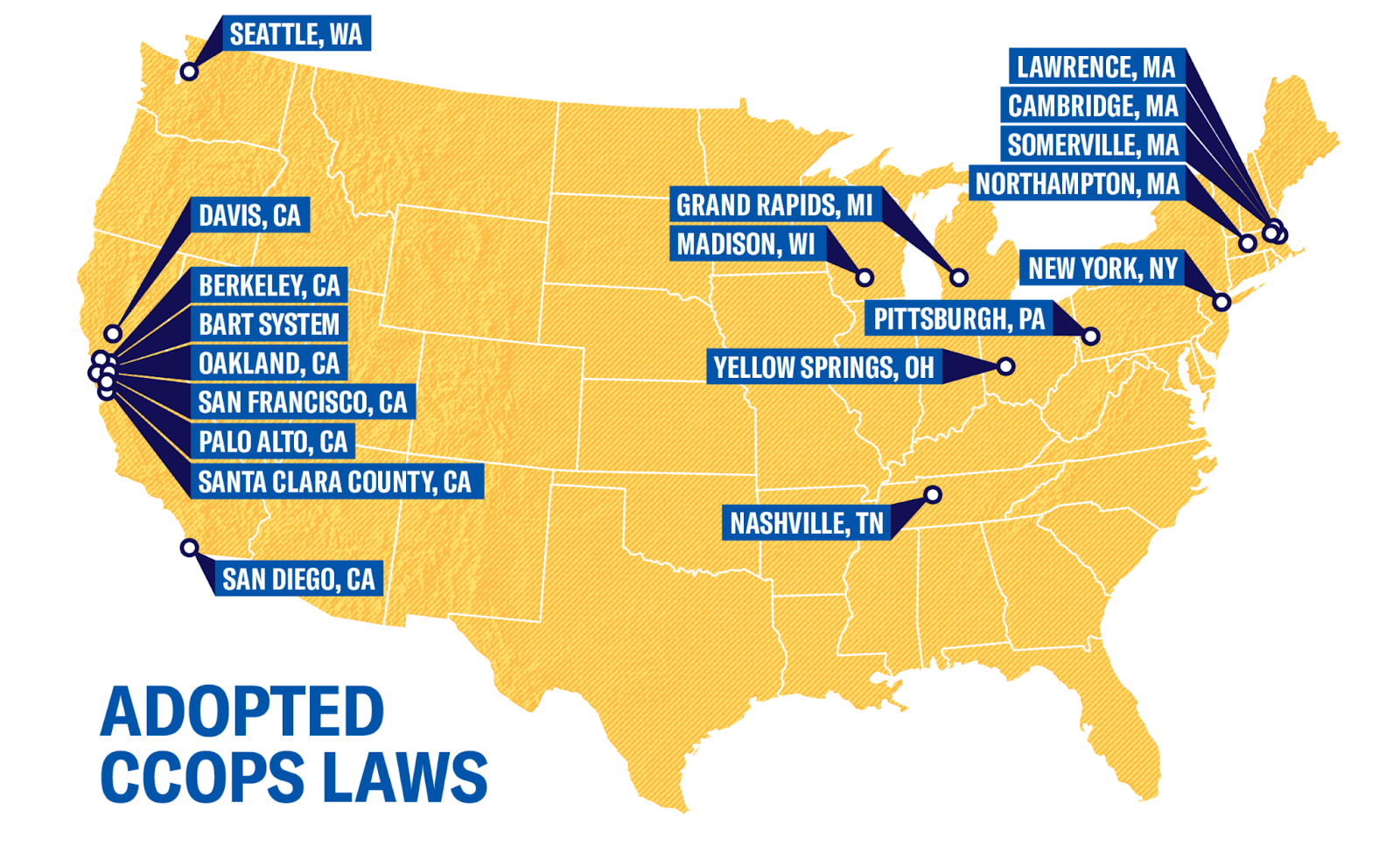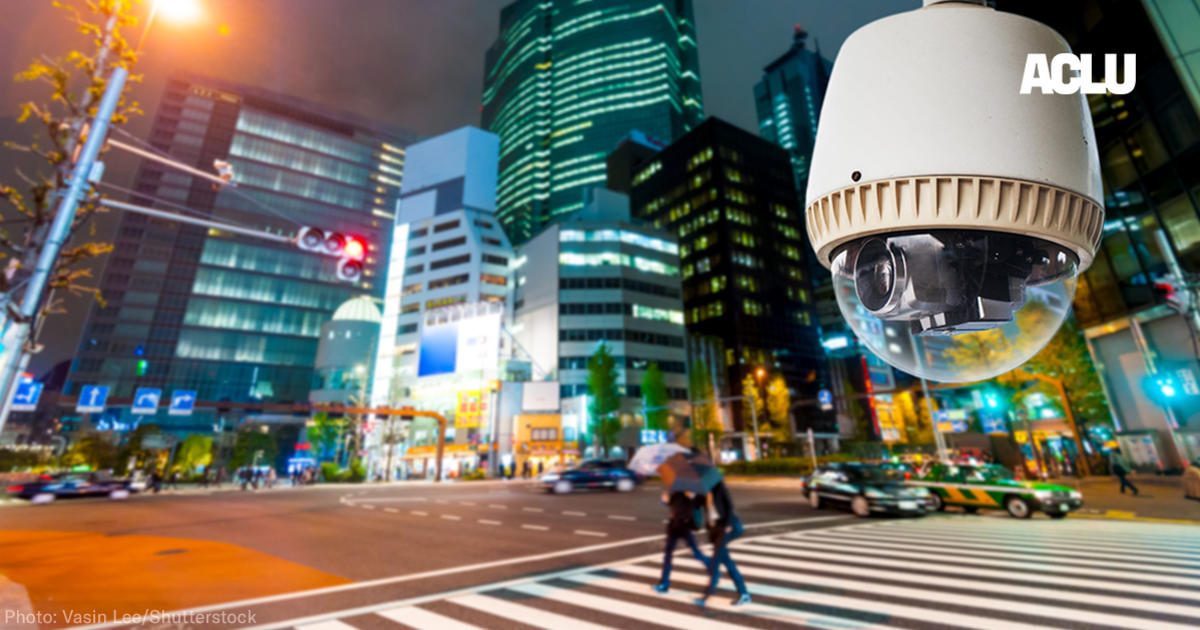 Back to Case Studies
Back to Case Studies
Location
New York, NY
Technology has made it easier for police departments to surveil the communities they are charged with protecting. Some of the surveillance technologies themselves, such as facial recognition, are racially biased. Additionally, virtually every surveillance technology has been found - like policing itself - to be disproportionately deployed against communities of color.
The ACLU’s Community Control Over Police Surveillance (CCOPS) is an advocacy and community organizing initiative developed in direct response to the harms of surveillance technologies and their growing use by police. CCOPS ordinances protect the privacy of communities and increase transparency and inclusion in the development of police surveillance practices. CCOPS laws help ensure the appropriate and responsible use of technology deployed by police. Furthermore, CCOPS laws allow communities to have a real and meaningful opportunity to reject the use of unwelcome surveillance technologies before they are acquired and deployed.
 CCOPS ordinances have been adopted by 19 cities around the United States, where they protect and empower over 16.2 million people.
CCOPS ordinances have been adopted by 19 cities around the United States, where they protect and empower over 16.2 million people.
Police departments around the United States can acquire and deploy a vast array of surveillance technologies with minimal to no oversight. Facial recognition software, cell phone tracking devices, automatic license plate readers, and predictive policing software are among the technologies commonly used. But surveillance technologies do not pose an equal threat to everyone. Law enforcement officials use surveillance technologies in ways that magnify racial bias and stereotypes in the course of their work. Furthermore, the technology itself can be racially biased. Facial recognition is one increasingly popular tool among law enforcement that is significantly less accurate in identifying darker-skinned faces.1 Predictive policing software, which relies on historically biased policing data to inform its predictions, also raises concerns over racial and socioeconomic bias.
 CCOPS legislative efforts have been at the forefront of responding to the dangers posed at the intersection of policing, surveillance technologies, and racial bias within American law enforcement.
CCOPS legislative efforts have been at the forefront of responding to the dangers posed at the intersection of policing, surveillance technologies, and racial bias within American law enforcement.
CCOPS was launched as a nationwide initiative in 2016. CCOPS increases transparency and police oversight by encouraging the adoption of municipal legislation. The goal is to empower local communities to decide if and how their local law enforcement agency should use surveillance technologies.
The national ACLU organization developed a model CCOPS bill. ACLU state chapters work with local communities and organizations to tailor the model bill to the needs of each particular community. As a result, CCOPS ordinances vary from city to city, but the shared outcome is (1) increased transparency, oversight, and regulation of policing surveillance practices and increased community engagement and (2) influence over decisions about if and how police may use surveillance technologies. The CCOPS ordinance in Cambridge, MA, for example, requires city council approval before Cambridge police can purchase or use various surveillance tools, as well as regular reporting on technology usage. The CCOPS law in San Francisco included the first municipal ban on the use of facial recognition in the United States. In 2020, the New York City Council enacted the Public Oversight of Surveillance Technology (POST) Act, another CCOPS ordinance that requires the NYPD to publicly disclose information about surveillance technologies in use.
While CCOPS’s focus is on surveillance technology, the biggest concern of the initiative is racial justice. Police surveillance has disproportionately targeted communities of color. CCOPS addresses this issue by advocating for public disclosure of where and how local police would like to use surveillance tools. It also empowers the public to set rules for the surveillance technology’s use or to reject its use altogether.
CCOPS transparency and community-focused legislative efforts have been at the forefront of responding to the dangers posed at the intersection of policing, surveillance technologies, and racial bias within American law enforcement. CCOPS ordinances have been adopted by 19 cities around the United States, including San Francisco and New York City, where they protect and empower over 16.2 million people. Community engagement is a cornerstone of CCOPS; the local communities have become substantially more engaged in the democratic process as part of the initiative. Going forward, the ACLU will continue to engage in legislative and community advocacy efforts in additional cities around the country, with the hope that these local efforts trickle up to the state and federal levels of government.
¹ Joy Buolamwini and Timnit Gebru, “Gender Shades: Intersectional Accuracy Disparities in Commercial Gender Classification,” in Conference on Fairness, Accountability and Transparency (Conference on Fairness, Accountability and Transparency, PMLR, 2018), 77–91, http://proceedings.mlr.press/v81/buolamwini18a.html. ↩